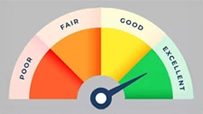Online vs Offline Business Loan: Pros and Cons
Disclaimer: This blog is generic in nature. Please contact Ujjivan Small Finance Bank for details on MSME Loan application process.
September 03, 2025

According to recent studies, the global business loan market is projected to reach USD 12.15 trillion by 2027, driven by increasing demand from small and medium-sized enterprises (SMEs). The process of applying for a business loan has evolved over time, with businesses now having the option to apply either offline or online. While online business loan applications offer convenience, offline applications bring several key benefits, particularly for businesses looking for personalized assistance and more trust-based interactions.
In this blog, we will dive into the nuances of both offline and online business loan applications, with a focus on the advantages of going offline.
What is an Offline Business Loan Application?
An offline business loan application refers to the traditional method of applying for a loan through in-person visits or paper submissions. Businesses approach banks to submit their loan applications, often with a relationship manager or loan officer guiding them through the process. These loans can be obtained through face-to-face meetings, phone calls, or by visiting a branch to submit physical paperwork.
Benefits of Offline Business Loan Application
1. Personalised Assistance and Guidance
One of the most significant advantages of offline business loan applications is the availability of personalized guidance. When applying offline, you are typically working directly with a loan officer or relationship manager who can provide expert advice tailored to your specific business needs. This can help businesses navigate complex loan products and understand the fine print of the terms and conditions. Personal interactions often lead to a clearer understanding of what is required, making the entire process more transparent and manageable.
2. Higher Chances of Approval for Complex Loans
For businesses that require complex or larger loans, offline applications may prove to be more beneficial. Loan officers can directly assess the business's needs, cash flow, and future prospects. This one-on-one interaction can provide a more in-depth evaluation of your business's situation, increasing your chances of getting approved for a loan, especially when dealing with unconventional or customized lending terms.
3. Building Trust and Stronger Relationships
Offline applications allow businesses to build a more personal relationship with lenders. In many cases, financial institutions are more willing to work with businesses they have an established relationship with. When meeting face-to-face, businesses can demonstrate their commitment to the relationship, potentially leading to more favorable loan terms, such as lower interest rates or better repayment terms. Over time, these relationships can foster trust, which can be invaluable for businesses seeking further financial assistance.
4. Better Communication and Support
In offline loan applications, businesses have direct access to a relationship manager who can answer questions, resolve issues, and provide timely updates throughout the loan process. This can lead to better communication compared to online platforms, where customers may experience delays in response times. The hands-on support provided by offline applications can be reassuring, especially for first-time borrowers who are unfamiliar with the loan process.
5. Customisation of Loan Terms
Offline applications may allow for more flexibility when it comes to negotiating loan terms. Businesses can discuss their specific needs, such as interest rates, repayment schedules, or loan amounts, with their loan officer. This customised approach is often not possible in online applications, where terms are more rigid and automated. That said, loan customisation may vary across banks and could be based on several parameters.
6. Access to Offline-Only Loan Products
Certain loan products are exclusive to offline applicants, meaning they are not available through online platforms. This includes specialized loans for industries like agriculture, manufacturing, or export businesses. These products might have unique terms designed to meet specific business needs, and only offline channels provide access to such offerings.
Online Business Loan Applications: A Quick Overview
While offline loans have their distinct advantages, it is important to understand the merits of online business loan applications. These include speed, convenience, and 24/7 access to loan applications. However, online applications may lack the same level of personalised support, and businesses might face challenges in understanding complex terms or negotiating customized loan options.
In contrast to the offline model, online applications are typically processed faster, with automatic credit scoring and disbursal systems, making them ideal for businesses seeking fast, short-term loans with straightforward terms.
Final Thoughts
While both offline and online business loan applications have their advantages, offline loans offer several key benefits that make them a preferred choice for many businesses. From personalised guidance and customized loan terms to building strong, trust-based relationships with lenders, the offline method ensures a higher level of service and support. For businesses seeking tailored financial solutions and more intricate loan products, offline applications can provide the personal touch that online platforms cannot replicate.
If your business values direct communication, bespoke advice, and long-term relationships with financial institutions, an offline business loan application might be the best route for you.
Take your business to the next level with Ujjivan Small Finance Bank MSME Loans. We have a host of MSME products tailored for your unique business growth needs. Additionally, we offer MSME Overdraft facilities for urgent business capital requirement. Browse through our suite of products and apply today!
Disclaimer:
The contents herein are only for informational purposes and generic in nature. The content does not amount to an offer, invitation or solicitation of any kind to buy or sell, and are not intended to create any legal rights or obligations. This information is subject to updation, completion, amendment and verification without notice. The contents herein are also subject to other product-specific terms and conditions, as well as any applicable third-party terms and conditions, for which Ujjivan Small Finance Bank assumes no responsibility or liability.
Nothing contained herein is intended to constitute financial, investment, legal, tax, or any other professional advice or opinion. Please obtain professional advice before making investment or any other decisions. Any investment decisions that may be made by the you shall be at your own sole discretion, independent analysis and evaluation of the risks involved. The use of any information set out in this document is entirely at the user’s own risk. Ujjivan Small Finance Bank Limited makes no representation or warranty, express or implied, as to the accuracy and completeness for any information herein. The Bank disclaims any and all liability for any loss or damage (direct, indirect, consequential, or otherwise) incurred by you due to use of or due to investment, product application decisions made by you on the basis of the contents herein. While the information is prepared in good faith from sources deemed reliable (including public sources), the Bank disclaims any liability with respect to accuracy of information or any error or omission or any loss or damage incurred by anyone in reliance on the contents herein, in any manner whatsoever.
To know more about Ujjivan Small Finance Bank Products Visit:"https://www.ujjivansfb.in"
All intellectual property rights, including copyrights, trademarks, and other proprietary rights, pertaining to the content and materials displayed herein, belong
to Ujjivan Small Finance Bank Limited or its licensors. Unauthorised use or misuse of any intellectual property, or other content displayed herein is strictly prohibited and the same is not intended for distribution to, or use by, any person in any jurisdiction where such distribution or use would (by reason of that person’s nationality, residence or otherwise) be contrary to law or registration or would subject Ujjivan Small Finance Bank Limited or its affiliates to any licensing or registration requirements.
FAQs
1. What is the main difference between offline and online business loan applications?
The key difference lies in the process. Offline business loan applications require physical visits to financial institutions and personal interactions with loan officers, whereas online applications can be completed remotely through digital platforms, offering speed and convenience.
2. Can I negotiate better loan terms offline than online?
Yes, offline business loan applications allow for direct negotiations with loan officers, offering the opportunity to discuss interest rates, repayment terms, and other conditions. This personalized interaction can result in better terms compared to the fixed terms offered online.
3. Are offline business loans better for large loan amounts?
Offline loans are generally better suited for larger or more complex loan amounts. The personalized evaluation of your business’s financial health, along with the ability to negotiate terms, increases the likelihood of getting approved for substantial loans.
4. How long does it take to process an offline business loan?
The processing time for offline business loans can be longer than online applications due to the manual documentation, verification, and personalized assessment required. Typically, it can take a few days to weeks, depending on the complexity of the loan.
5. What documents are required for an offline business loan application?
Common documents include proof of business ownership, financial statements, tax returns, a business plan, and any collateral documents if required. These are submitted in person during the application process.
6. Can I apply for a business loan offline if I have poor credit?
Yes, applying offline can sometimes provide more flexibility if you have poor credit. Loan officers can work with you directly to assess alternative factors like your business’s cash flow or assets, which might improve your chances of approval.
7. Is there a risk of hidden fees with offline business loans?
While offline loans tend to offer more transparency due to face-to-face interactions, it is still important to review all loan documents carefully. Loan officers are required to disclose all fees, but it’s advisable to ask for clarifications if anything is unclear.
Latest Blogs

APK Fraud: How One Wrong Download Could Empty Your Bank Account
May 13, 2025
Picture this. You’re sipping your evening tea when your phone rings.

Gold Loan LTV Ratio Explained (75% to 85%): What It Means for Borrowers
March 20, 2025
In June 2025, the Reserve Bank of India (RBI) introduced a significant relaxation for gold loan borrowers: the maximum Loan-to-Value (LTV) ratio for loans below ₹2.5 lakh was raised to 85%, up from the long-standing cap of 75%. Loans between ₹2.5 lakh and ₹5 lakh can now go up to 80%, while loans above ₹5 lakh continue under the 75% ceiling.

Good Debt vs Bad Debt: Learn the Difference
August 13, 2025
Every month, millions of Indians wait for the familiar debit alert, an EMI deducted from their account.

Got a Tax Refund? 5 Smart Ways to Put Your 2025 Refund to Work
August 13, 2025
For many taxpayers, there’s a unique sense of relief when a tax refund arrives.

Credit Score Not Improving? 5 Mistakes You Might Be Making
August 13, 2025
For most of us, a credit score feels like a silent judge sitting in the background of our financial lives.




